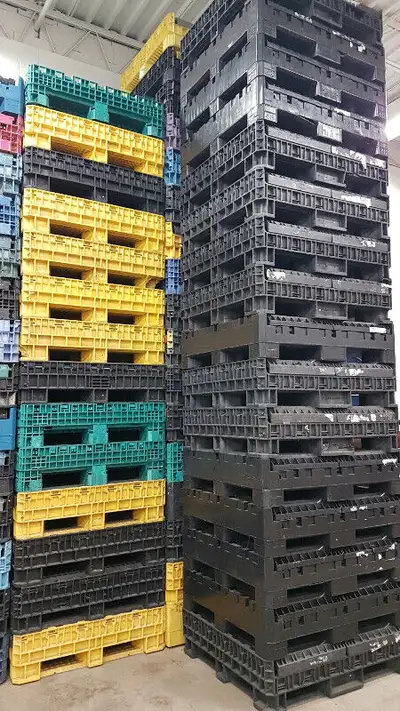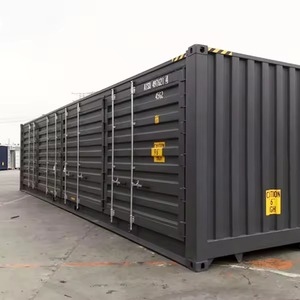Why used plastic containers are popular in food and manufacturing industries
Wiki Article
Exactly How Bulk Containers Can Improve Efficiency in Your Product Packaging Procedures
Mass containers play an essential duty in optimizing product packaging procedures. Their style enables better use upright room and promotes arranged stock management. This efficiency causes reduced material replenishment frequency and lower labor expenses. Additionally, the durability of these containers lessens item damage. As companies seek ways to boost their processes, recognizing the diverse benefits of mass containers comes to be important. What various other benefits might they give the table?Streamlined Storage Solutions
As business look for to optimize their procedures, structured storage services have actually ended up being vital for boosting product packaging efficiency. Reliable storage not only saves area but additionally facilitates quicker accessibility to materials, which is crucial in busy production settings. Bulk containers, designed for very easy piling and organization, greatly lower the complexity of storage space systems. They allow organizations to make the most of vertical space while reducing the footprint required for stock.Additionally, these containers commonly feature ergonomic designs that simplify managing and transportation, lowering the risk of injury and improving operations. By settling materials wholesale containers, business can reduce the regularity of restocking and improve their supply chain procedures. Generally, the execution of effective storage solutions cultivates a more organized work space, leading to increased efficiency and minimized operational costs. With thoughtful design and strategic use mass containers, organizations can attain notable renovations in their packaging procedures.

Waste Reduction and Sustainability
While the quest of efficiency often drives packaging decisions, waste reduction and sustainability have become essential factors to consider in modern-day procedures. Business increasingly acknowledge that embracing mass containers can greatly minimize product waste. These containers frequently utilize less packaging material than traditional methods, leading to a smaller sized carbon impact.Moreover, mass containers can be reused multiple times, which further decreases the demand for single-use product packaging and decreases general waste going into landfills. Their style commonly permits much easier recycling processes, aligning with sustainability objectives.
Furthermore, business that prioritize waste decrease can improve their brand reputation, attracting eco conscious customers. By executing bulk containers, services not just simplify procedures yet likewise add positively to environmental stewardship. This twin advantage of operational effectiveness and sustainability placements business positively in an open market progressively concentrated on environmentally friendly techniques.
Enhanced Production Line Effectiveness

Implementing mass containers on production line considerably improves effectiveness by streamlining the handling and transport of materials. By using mass containers, manufacturers can lower the regularity of product replenishment, permitting workers to concentrate on assembly jobs as opposed to continuous stock administration. This results in less disturbances and a smoother workflow, inevitably enhancing efficiency.
In addition, bulk containers are designed for very easy integration with automated systems, additionally enhancing the setting up process. Their standardized shapes and sizes assist in far better company, enabling workers to find and access materials swiftly. This reduction in search time adds to a much more fluid production atmosphere.

Price Cost Savings and Boosted Profit Margins
Remarkable cost savings can be realized through the adoption of mass containers in packaging processes. By decreasing the requirement for several smaller sized plans, firms can decrease material prices notably. Mass containers typically require much less product packaging product on the whole, resulting in lower expenses on products. In addition, the effectiveness of bulk handling lessens labor prices related to packaging and unpacking, even more enhancing cost savings.Fewer journeys to suppliers and reduced transportation costs are also key benefits, as mass containers permit enhanced product ability per delivery. This higher volume not only minimizes delivery costs yet additionally optimizes storage space within centers, bring about boosted stock administration.
The longevity of bulk containers typically equates to reduce damage prices throughout handling and transportation, maintaining item stability and reducing waste. Jointly, these aspects add to improved profit margins, making bulk containers an economically advantageous selection for organizations looking for performance in their product packaging procedures.
Versatility Across Industries
Mass containers provide exceptional adaptability across numerous markets, making them a valuable possession beyond simply cost financial savings. In the food and beverage sector, these containers promote the risk-free transportation and storage of big amounts of components, improving efficiency in assembly line. In pharmaceuticals, mass containers ensure compliance with stringent hygiene standards while accommodating the bulk handling of basic materials. The chemical market additionally benefits, as these containers endure rough materials and avoid contamination, sustaining secure procedures. used collapsible bulk containers. In click here addition, the farming industry uses bulk containers for moving fertilizers and grains, optimizing logistics and reducing waste. Their flexibility encompasses production, where mass containers streamline setting up procedures and minimize the requirement for too much product packaging. This cross-industry functionality not just enhances functional efficiency but also advertises sustainability through minimized product packaging waste, showing the integral duty bulk containers play in contemporary supply chainsOften Asked Questions
Exactly How Do Mass Containers Effect Worker Safety in Product Packaging Workflow?
Bulk containers substantially improve employee safety and security in packaging procedures by minimizing hands-on handling, lessening injury threats, and advertising ergonomic practices. Their layout assists in safer transportation and storage space, ultimately developing a much more secure workplace for all employees.
What Materials Are Mass Containers Typically Made From?
Mass containers are commonly made from resilient materials such as high-density polyethylene, wood, polypropylene, or metal - used plastic containers. These products provide toughness, resistance to environmental aspects, and suitability for various materials, ensuring efficient and risk-free transportation of products
Can Bulk Containers Be Customized for Certain Products?
Yes, bulk containers can be customized for details items. Manufacturers often tailor measurements, products, and features to meet one-of-a-kind needs, ensuring excellent protection and efficiency during storage space and transport of numerous goods.Just How Do Bulk Containers Affect Transport Logistics?
Mass containers simplify transportation logistics by taking full advantage of cargo area, lowering the number of trips needed, and minimizing managing prices (used plastic containers). Their standardized dimensions facilitate efficient loading and unloading, ultimately leading to enhanced functional effectiveness throughout the supply chainWhat Is the Lifespan of Bulk Containers in Routine Usage?
The lifespan of mass containers in routine usage commonly ranges from five to 10 years, relying on material quality, dealing with practices, and environmental conditions. Appropriate maintenance can considerably expand their use and performance.Implementing mass containers on setting up lines significantly improves performance by simplifying the handling and transport of materials. Bulk containers commonly call for less product packaging product on the whole, resulting in reduced expenses on products. In pharmaceuticals, bulk containers ensure conformity with rigid hygiene criteria while fitting the mass handling of raw materials. Their flexibility extends to production, where mass containers simplify assembly processes and decrease the requirement for excessive product packaging. Bulk containers considerably enhance staff member safety and security in packaging operations by minimizing manual handling, lessening injury risks, and promoting ergonomic techniques.
Report this wiki page